Iran, Oman Agree To Revive Gas Supply Deal Stalled For Two Decades
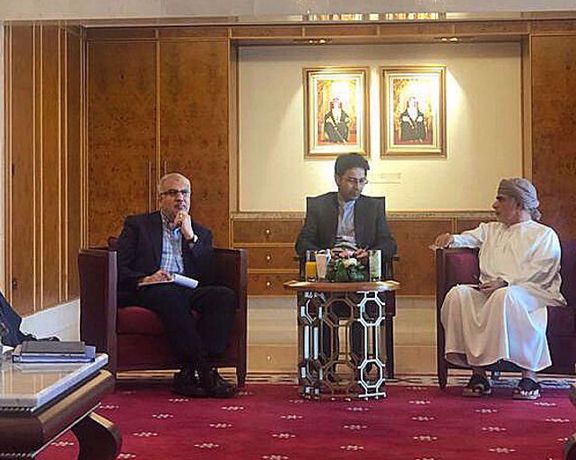
Iran and Oman have agreed to revive a gas supply deal that dates back to two decades ago while Oil Minister Javad Owji is on a visit to Muscat.

Iran and Oman have agreed to revive a gas supply deal that dates back to two decades ago while Oil Minister Javad Owji is on a visit to Muscat.
According to a report by Iran’s official news agency IRNA on Saturday, Owji and his Omani counterpart Mohammed Al Rumhi agreed in a meeting to start laying the gas pipeline that will enable Iran to pump natural gas to the Arab Sultanate.
Describing the project as one of the biggest regional energy projects, the report said the initial agreement was signed in 2004 between their oil ministers but has been stalled since then.
According to the contract, Iran committed to start supplying 30 million cubic meters (mcm) per day of natural gas to Oman by 2008 and then increase the volume to 70 mcm per day by 2012.
The two countries also reached another agreement in 2013 according to which Iran was expected to pump 28 mcm a day of gas to Oman for 15 years through a pipeline laid on the bed of the Persian Gulf. The project, which had been estimated to earn Iran more than $1 billion annually, never became operational.
The report said that Owji and Rumhi also reached agreements on the joint development project for the shared Hengam oil and gas field, located within their maritime boundaries in the Strait of Hormuz.
President Ebrahim Raeisi is scheduled to travel to Oman on Monday for an official visit, while Muscat has traditionally played a mediating role between Tehran and Washington.
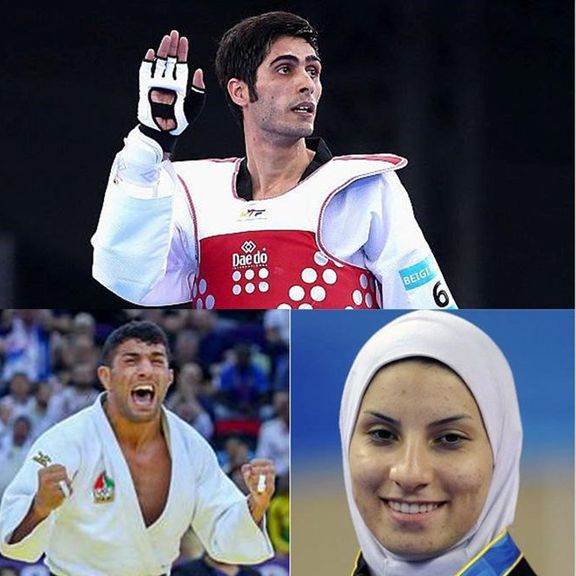
Iran’s Ministry of Sports has rejected reports that athletes have to provide a property deed to be allowed to leave the country for international competitions.
The ministry’s public relations manager Mohsen Motamedkia denied the news that the ministry takes collateral from athletes for foreign travel in a tweet on Friday, saying he enquired about the issue and the ministry’s authorities denied the claims.
He made the remarks in reaction to a post by sport journalist Hiva Yousefi, who had publicized the issue on twitter.
Replying to the journalist, a member of Iran’s national rowing team, Ahmad Ahmadi, said the property must be at least 5 billion rials (about $20,000) and owned by the athlete or a family member, adding that if the athlete does not return to the country, it will be transferred to the relevant sport federation's treasury.
Ahmadi said a notarized pledge to transfer the property is signed before the trip, adding that the federation also gets two guarantee-of-return undated checks of about $500 and $1,000 from the athletes.
Earlier in the month, Yekta Jamali, the first Iranian female weightlifter who won medals in international tournaments, sought asylum in Germany after she left Iran’s team at the World Junior Weightlifting Championship in Greece.
About 30 Iranian athletes in recent years have defected from national teams and sought asylum in other countries, due to alleged threats and corruption in sports federations as well as Iran’s policy of not allowing athletes to compete against Israeli peers. For women mandatory hijab is also an issue.
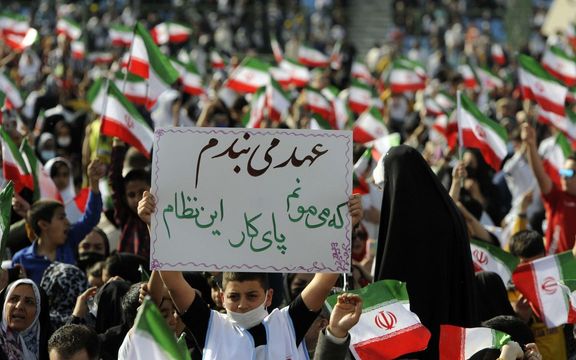
Critics say promoting ‘Hello Commander’, a pop genre religious and ideological song among Iranian children is reminiscent of Hitler Youth in Nazi Germany.
State propaganda organizations and the ministry of education have been promoting ‘Hello Commander’ in schools since it was broadcast from state television for the first time this year after Supreme Leader Ali Khamenei’s Iranian New Year speech on March 20.
Teaching the song to children has apparently become compulsory in schools. In the past two months it has been performed at huge gatherings of school children in city squares and stadiums and broadcast by the state television (IRIB) in news and other programs.
‘Hello Commander’ is a song dedicated to Mahdi, the 12th Imam of Shiites who has been in occultation since the 9th century according to believers. The song and its promotion are unusual as the music is in the often frowned upon pop genre which has no place on Iran’s state media.
“Me, the little me, will become your general,” children sing to the Imam, promising him to rise up, to sacrifice everything to him, and to become his Ghasem Soleimani, the Revolutionary Guard’s Qods Force commander who was killed by the United States in Baghdad in 2020.
The song also mentions 313, the number of the Imam’s helpers when he returns to earth, and is full of words such as “soldier, general, commander, and “uprising” as well as other religious terminology and notions.
‘Hello Commander’ also mentions Supreme Leader Ali Khamenei who is believed by his devotees to be the Imam’s representative on earth and has to be obeyed as the Imam would be if he were present among believers. “Hello Commander! Sayyid Ali [Khamenei] has called his children [to mobilize]!” children sing.
The education ministry is now planning a 100,000-strong gathering at Tehran’s Azadi Stadium to perform the song at a special ceremony next Thursday (May 26) although a football match this week at the same stadium was held with no spectators “to prevent the spread of Covid.” Many alleged that the decision to hold the match without spectators was a measure against eruption of an anti-government protest during or after the match
The promotion of the song by the state media is meant to indoctrinate children and brainwash them, critics allege. They also say the promotion of the song by state media and the Islamic Republic’s propaganda organizations is reminiscent of Nazi propaganda methods which included teaching children and the youth songs in praise of the Führer.
Many social media users have seen the song as propaganda for Khamenei as the Imam’s deputy, and commander-in-chief of Iran’s Armed Forces, and drawn a parallel between him and Hitler by sharing a video of Nazi Youth gatherings with the original audio replaced with ‘Hello Commander’.
“In his last years, like all other dictators, Hitler resorted to performance of a ‘Hello Commander’ song in schools to reassure his supporters but this didn’t save him from defeat because it was too late,” one of the many such tweets by critics said.
London-based Iranian journalist Morteza Kazemian also shared photos of Nazi Germany’s huge gatherings in Hitler’s support on Twitter with the ‘Hello Commander’ hashtag and said dictators are destined to fall, even if they are as powerful as Hitler.
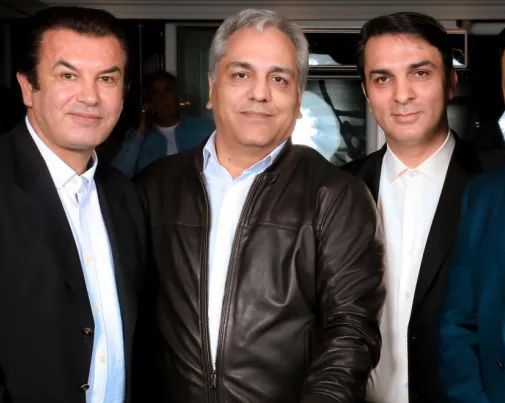
The Iranian national soccer team’s manager, who is going to Canada for a controversial friendly next month, recently attended a party with a man wanted by the FBI for attempted kidnapping.
Photos of the party show Hamid Estili beside Mahmoud Khazein, who is sought by the FBI in relation to a plot to kidnap international targets, including three people in Canada, CBC News reported on Saturday.
The event was a birthday party in Tehran on April 8, almost a year since a warrant had been out for the arrest of the alleged Iranian intelligence informant.
According to the FBI list, Khazein is facing criminal charges in the United States, including conspiracy to kidnap; conspiracy to violate the international emergency economic powers act; conspiracy to commit bank and wire fraud; and conspiracy to commit money laundering.
One of the alleged targets of the kidnapping plot was journalist and rights activist Masih Alinejad, who told CBC News that the FBI is now looking into a possible connection between Estili and Khazein.
"I want the Canadian police to consider that as well … Sports federations are being controlled by members of the Revolutionary Guards. Would you allow anyone associated with the kidnappers to come to Canada to enjoy freedom?” she said.
Iran's soccer team, known by its nickname Team Melli, is headed to Vancouver for an exhibition game on June 5 despite objections by those who lost loved ones in Iran’s downing of Flight PS752 in 2020.

Iran says it is transforming commercial container or cruise ships into large military vessels, the Fars News agency reported Saturday.
The agency, which is affiliated to the Revolutionary Guard Corps (IRGC), said the IRGC navy was due to commission ‘Shahid Mahdavi’ as a forward base ship based at Bandar Abbas port that will after refitting be among Iran’s largest vessels. The ship was named in honor of Nader Mahdavi, one of seven IRGC personnel ‘martyred’ in an engagement with the United States navy in October 1987 during the Iran-Iraq war.
Aurora Intel, defense analysts, said the ship – formerly called Savin, Sarita, Dandle, Twelfth Ocean, Iran Esfahan – is a 22-year-old container vessel with a nominal capacity of 3,300 20-foot equivalent units (TEUs).
At 240 meters long and 32 meters across, the new IRGC ship appears to be of similar length to the Iranian navy's forward base ship Makran, which was formerly an oil tanker, but it will be by far the largest ship in the IRGC’s naval forces. Fars said the IRGC is upgrading cargo ships into military ones following the US practice as with the USS Lewis B Puller expeditionary mobile base vessel and the MV Ocean Trader, which serves as a forward base for US special forces.
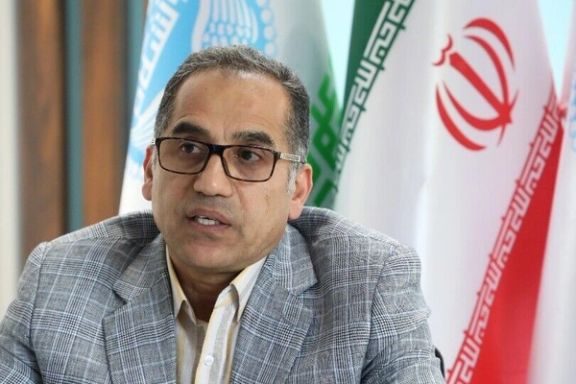
A member of Russia-Iran chamber of commerce in Tehran has said that Russian investors prefer the United Arab Emirates and other countries to Iran for investments.
Jalil Jalaifar, who is a member of the board at Russia-Iran chamber of commerce told ILNA in Tehran that Iran has not been able “to attract even one investor.” He explained that Russian investors study the internal conditions in Iran and conclude that it is not a hospitable environment. He added that “investors realize…they will face a wall” in Iran.
Instead, Jalalifar argued that 50-60 Russian companies register in the UAE daily, while in Iran bureaucratic impediments dissuade foreigners from opening any office or subsidiary. A large bureaucracy is in charge of approving names that owners select for their companies, and this in itself is enough to drive away any foreign investor.
Iranian media, former politicians and pundits in recent days have been highlighting the fact that Russia is taking oil and steel export market share from Iran, while the hardliner government in Tehran has been advertising the benefits of expanded ties with Moscow and Beijing.
Ironically, China is said to have shifted its oil imports from Iran to purchases of heavily discounted Russian crude. This is an alarming turn of events for Tehran, which amid US oil export sanctions heavily depends on China as a buyer.
Reuters reported on Friday that Iran's crude exports to China have fallen sharply since the start of the Ukraine war as Beijing favored heavily discounted Russian oil, leaving almost 40 million barrels of Iranian oil stored on tankers at sea in Asia and seeking buyers.
Some tankers have been anchored since February but the number storing Iranian oil climbed swiftly since April, trading and shipping sources told Reuters, as more Russian oil headed east.
Jalalifar also said that since the invasion of Ukraine trade between Russia and Iran has probably doubled, but he emphasized that the volume is negligible compared to Russia’s overall trade.
The latest figures released a few months ago showed 3-4 billion dollars in annual bilateral trade between the two counties with an upward trajectory.
Jalalifar explained that Iranian ports and bureaucracy are not ready to assist an expansion in trade with Russia. “Red-tape takes up to a week to clear” at the northern Caspian Sea ports, he argued.
In land transport he argued that the border crossing point to the Republic of Azerbaijan at Astara 400 trucks can clear custom, but daily interruption in Internet access shuts down Iranian customs and exports must wait for days.
He explained that companies expediting exports are few and weak and the government ha to allow the private sector to compete in this sector.
The chamber of commerce member said that the Iranian government demands a host of documents for transiting goods from one free economic zone to another in the country. This red tape is completely unnecessary since the goods are not destined for Iran’s domestic market. It hinders the country’s proclaimed goal of becoming a transit hub in the region, especially for Russia amid the war in Ukraine.
“We need a revolutionary action and judicial authorities have to intervene” to stop red tape that stops Iran’s economic development, Jalalifar argued.